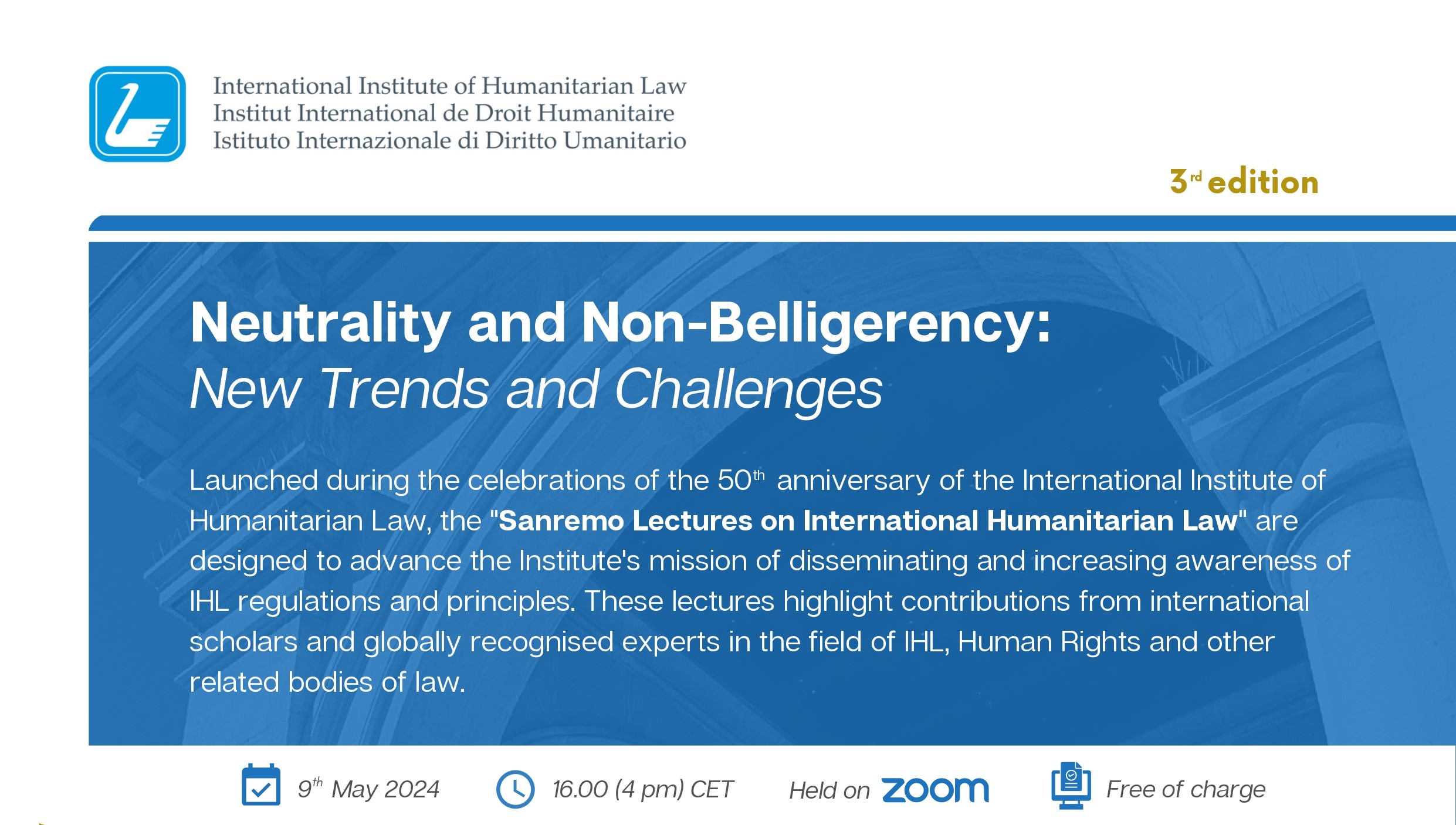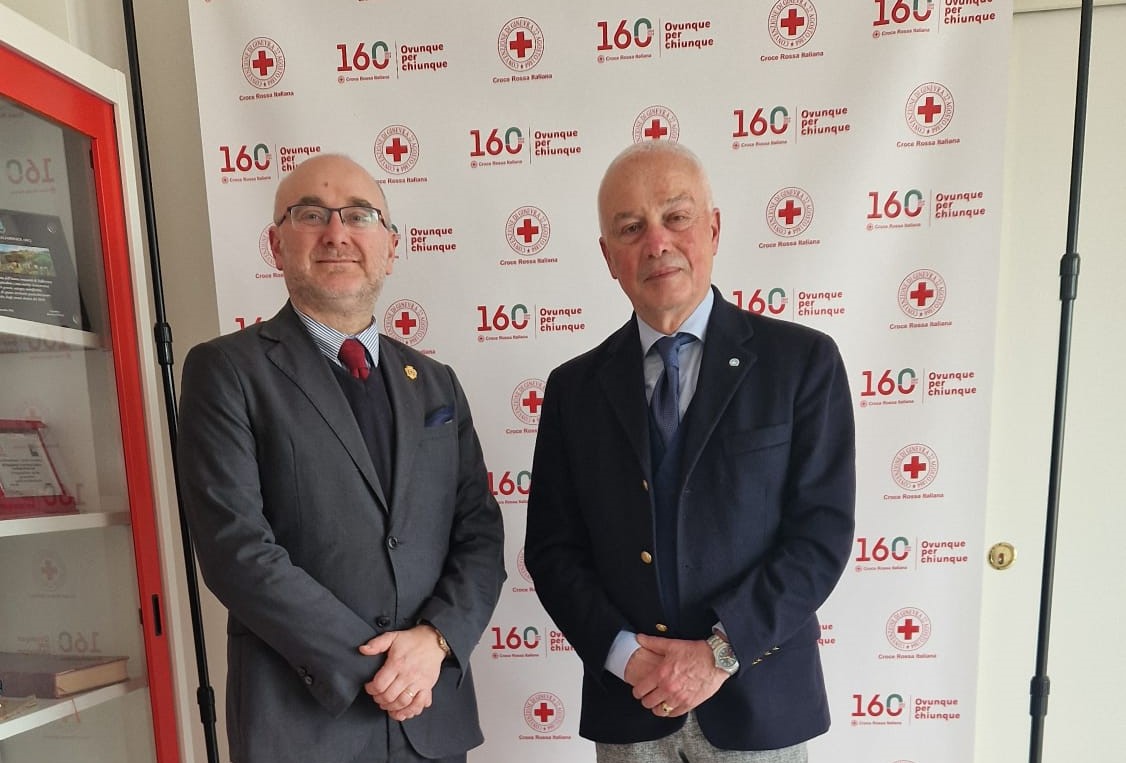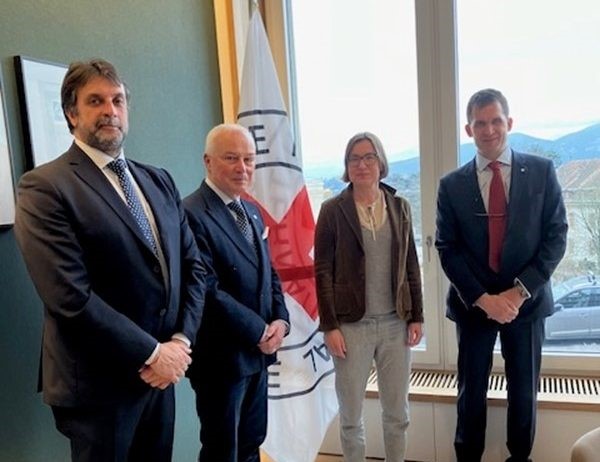Location: Home-based, with missions to Sanremo and Geneva if called upon
Contractual modality: Individual Consultant / 3-month contract
Deadline for applications: 9 March 2024
Background
The International Institute of Humanitarian Law is an independent, non-profit, humanitarian association founded in 1970 in Sanremo, Italy. The Institute organizes training courses in the fields of international humanitarian law, human rights, refugee law and related issues and promotes dialogue by organizing international conferences, meetings and seminars of high-level government officials, scholars and practitioners.
The mission of the Department of International Refugee Law and Migration Law is to enhance the knowledge and skills of government officials, international organizations, civil society representatives, and academics involved in working with individuals in need of protection, including refugees, internally displaced persons (IDPs), stateless individuals, and migrants. Through its capacity-building initiatives and the exchange of experiences, the Department advocates for the preservation of human rights, thus complementing and augmenting the efforts of various stakeholders in the field of protection.
The Institute enjoys a consultative status at ECOSOC, a participatory status at the Council of Europe and holds observer status at the United Nations High Commissioner for Refugees (UNHCR) ExCom, and with the International Organization for Migration.
Through its Academic Unit, under the Refugee Department, the Institute supports universities and training institutions in developing and adopting academic curricula and training programs on forced displacement and statelessness. The Institute is a founding member of the Global Academic Interdisciplinary Network (GAIN) and is recognized as a global Sergio Vieira de Mello academic chair.
Role and functions
The Course Developer will develop academic curricula and training programs for the Institute’s in-house and cooperational courses on forced displacement and statelessness. This includes conducting needs assessments, defining clear learning objectives, structuring curriculum, creating engaging instructional materials, integrating technology, designing effective assessments, ensuring accessibility and inclusivity, providing feedback mechanisms, and continuously improving courses through iterative processes.
Strong communication and project management skills are essential for efficiently collaborating with stakeholders and guiding the course design process. Ultimately, the course designers will play a pivotal role in crafting educational experiences that meet the diverse needs of learners, align with learning objectives and foster continuous improvement.
The ideal candidate brings solid thematic knowledge of forced displacement and statelessness, demonstrates a deep commitment to the rights of forcibly displaced and stateless persons, and can navigate and respect diverse cultural contexts and perspectives, fostering inclusive and respectful learning environments. The incumbent is flexible and able to adapt to changing priorities, stakeholder needs, and the evolving global context surrounding forced displacement and statelessness.
The incumbent will work under the supervision and overall guidance of the Coordinator of the Academic Unit.
The main functions of the incumbent are as follows:
Curriculum Design
- Design comprehensive, engaging, and effective curricula and training programs on forced displacement and statelessness for various stakeholders, including universities, governments, international organizations, and NGOs.
- Conduct interdisciplinary research to ensure content is current, relevant, and reflects the latest international developments on forced displacement and statelessness.
- Collaborate with partner organizations and beneficiaries to tailor training programs to their needs and contexts.
Training Material Development
- Develop training materials tailored to different learning styles and needs, such as presentations, simulations, case studies, etc.
- Develop pre-training and post-training assessment tools to gauge participant knowledge and learning outcomes.
Innovative Delivery Methods
- Explore and integrate innovative teaching methodologies and technologies to enhance learning experiences, such as gamification, interactive e-learning platforms, etc.
- Adapt delivery methods to suit different contexts, including low-resource environments and remote learning situations.
Professional Development
- Stay abreast of pedagogical developments, technological advancements, and thematic issues related to international law to enhance the quality of training programs.
Required qualifications and experience
Required:
- A university degree in law, international relations, education, or a related field – Educational and professional development qualifications relating to the instructional design of training programs are an asset.
- Eight years of professional experience in human rights, refugee and migration issues, or a closely related area.
Desirable:
- Experience working in or with various cultural contexts and global settings.
- Experience in working with the United Nations or NGOs supporting refugees, IDPs, stateless persons, and migrants – Knowledge and concrete experience in the Asia-Pacific region is an asset.
Language and technical skills
Required:
- Fluency in English (both oral and written);
Desirable:
- Knowledge of other UN languages (i.e., French, Spanish, Arabic, and Russian) is an asset.
How to apply and selection process:
- Please submit your CV and the motivation letter through this form here.
- Short-listed candidates will be invited to undertake a written assignment and/or an interview with a Selection Panel.
- Please note that only short-listed candidates will be contacted – The Department reserves the right to start interviewing applicants prior to the deadline.
Contractual information:
- The incumbent will be offered a 3-month individual consultancy contract with the possibility for further extensions, subject to the availability of funds.
- The envisaged starting date is as soon as possible.
- The incumbent can perform the work remotely from any location, except when called upon to be available for on-site in Sanremo or Geneva. Performance will be measured based on designated outputs and deliverables
- The incumbent will be expected to be available to perform the services for an average of 18 days per month during the contract duration. The specific days of availability are subject to agreement with the designated supervisor.
- The incumbent will be responsible for paying social security contributions and taxes, if applicable, and the Institute will pay no contributions in this regard. The Institute will provide travel insurance coverage, terminal expenses, tickets, accommodation, and per diem for official travel on behalf of the Institute.
- The Institute is committed to diversity and inclusion within its workforce. All qualified candidates are encouraged to apply, irrespective of gender, nationality, religion, ethnic origin, sexual orientation, disability, pregnancy, age, or other status. Applications of persons with displacement backgrounds are particularly encouraged.
Visit the “Work with us” webpage for more information about other vacancies, internships and other opportunities.



